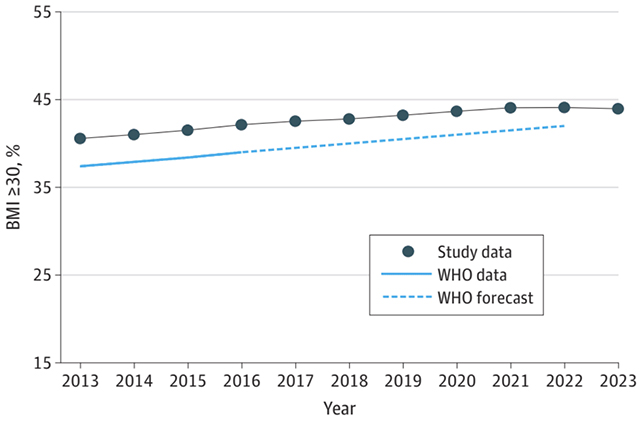ARTICLE AD
The number of people classed as obese in the US has dipped for the first time in more than a decade, giving experts some hope of seeing a reversal in concerning health trends.
Researchers from the Computational Epidemiology Lab at Boston Children's Hospital and Optum Life Sciences dug into the health records of more than 16.7 million people, matching data to better represent the US population.
The numbers showed that both average body mass index (BMI) and obesity rates across the population fell in 2023, having risen steadily since 2013 before leveling in 2022.
While we don't yet have any data for 2024, it's a promising sign that more people are changing their diets and increasing physical activity to improve their health.
 The study data shows a leveling off. (Rader et al., JAMA Health Forum, 2024)
The study data shows a leveling off. (Rader et al., JAMA Health Forum, 2024)BMI averages (weight in kilograms divided by height in meters squared) were 30.23 for 2021 and 30.24 for 2022, before dipping to 30.21 for 2023. Obesity rates, worked out as the percentage of people with a BMI greater than or equal to 30, showed a similar pattern.
Though a high BMI does not strictly translate into poor individual health, measures of body mass tend to reflect rates of illness and mortality in a population, making rising trends in obesity a public health concern.
"These findings suggest that BMI and obesity prevalence in the US decreased in 2023 for the first time in more than a decade," write the researchers in their published paper.
Using the raw data from the study participants, without weighting to match the larger US population, obesity levels were shown to be 46.2 percent for 2021, 46.0 percent for 2022, and 45.6 percent for 2023.
The biggest drops in obesity were in the southern states and among people aged 66 to 75. The researchers also note that obesity rates fell further in women than in men – all useful data points for future research to look at.
An increase in the use of GLP-1 medications for weight loss could help explain these results, the researchers say. These drugs, including Ozempic, Wegovy, and Mounjaro, are more commonly used in the American South.
However, it's still too early to draw solid conclusions. A more comprehensive database of information will be needed to confirm that Americans are starting to shed their adipose tissue.
"Obesity and BMI are imperfect proxies for adiposity; thus, future studies should investigate alternative body composition measures and potential causes for the observed shifts," write the researchers.
It's not clear yet which way obesity rates will go. Some experts are predicting a continuing rise, while others aren't so sure. What's certain is the direction we want it to go in – considering the numerous health issues that come along with being overweight, from brain aging to an increased risk of heart disease.
"While obesity remains a considerable public health concern, the observed reductions in obesity prevalence suggest an encouraging reversal from long-standing prior increases," write the researchers.
The research has been published in JAMA Health Forum.

 1 day ago
23
1 day ago
23 

